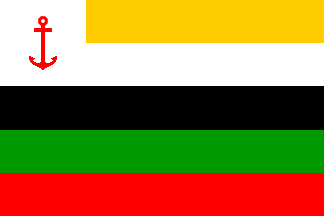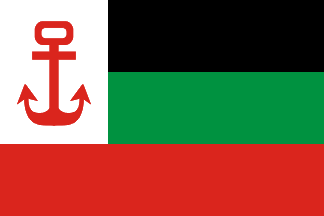
image by Miles Li, 22 September 2014

Last modified: 2020-07-31 by ian macdonald
Keywords: china | qing dynasty | naval rank flags | dragon | anchor |
Links: FOTW homepage |
search |
disclaimer and copyright |
write us |
mirrors
See also:
I usually don't deal with rank flags but imperial China must be an exception
for the extreme interest and mystery of its rank flags. This is the flag of a
first class admiral of the north squadron. It comes from the 1882 US navy flag
book. Other flags, from other sources also, show various combinations of coloured stripes and devices (mainly dragons). One has to note that these flag
are not from the republican time (when the striped State flag was used), but
they preceded it. In XIX c. sources, a flag of four stripes is often shown for
China (better, for Nanking) and after 1911 many striped flags (of unknown
colours) were used in Xinjiang. So, in parallel with the dragon, striped flags
are of old tradition in China: the rank flags seems to unify these two aspects.
It should be interesting to collect a bigger number of them and try to
understand the meanings of the different numbers of stripes and the different
colour combinations.
Mario Fabretto, 27 April 1997
The significances of the colours of the stripes can be interpreted as:
THE FIVE COLOURS together corresponded to the principal colours of the
ancient Chinese 'five ways' philosophy. (Page 108 of Whitney Smith's Flags
Through the Ages and Across the World describes these concepts. Note also that
blue and green were used interchangeably to represent East.)
Miles Li, 07 July 1999
Below are the rank flags of the Imperial Chinese Navy Beiyang Fleet, as
flown during the Sino-Japanese War of 1894-1895. They are as shown in the
"Fujian Arsenal" temporary exhibition at the Hong Kong Museum of Coastal Defence.
Miles Li, 22 May 2007
I would like to take this opportunity to revise
some pages on the rank flags of the Imperial Chinese Navy, as more information
have become available in a new book:
中國軍艦圖誌 (1855-1911)
Zhongguo junjian tuzhi (1855-1911)
by Chen Yue
Commercial Press (Hong Kong) Ltd 2013
ISBN 978 962 07 0361 4
The surname of the author is Chen, The relevant pages are pp.281-88
Miles Li, 04 June 2018

image by Miles Li, 22 September 2014

image by Miles Li, 22 September 2014

image by
Jaume Ollé, 22 September 2014 and Peter Hans van den Muijzenberg,
14 April 2015
According a photo taken in the Revolution Museum of Peking, the flag of
squadron commander is slighty different.
Jaume Ollé, 22 September 2014
Are the other two correct, or did you just photograph this one flag? The same
white field wouldn't fit as well for the others, but they could have had a
larger white field nevertheless.
Peter Hans van den Muijzenberg, 14 April 2015
Let me expand that question a bit, so the page can be cleaned up. Miles wrote
about three flags, but you write only about the Squadron Commander. Do Miles'
images of the Admiral and Fleet Commander match your photographs? Or do you not
have any pictures of the other two flags?
Peter Hans van den Muijzenberg, 14 May 2015